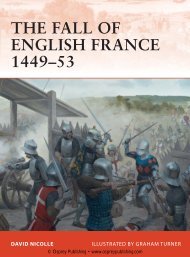Osprey - General Military - Knight - The Warrior and ... - Brego-weard
Osprey - General Military - Knight - The Warrior and ... - Brego-weard
Osprey - General Military - Knight - The Warrior and ... - Brego-weard
Create successful ePaper yourself
Turn your PDF publications into a flip-book with our unique Google optimized e-Paper software.
he Black Prince's reputation as a chivalric <strong>and</strong><br />
perfect knight was built early <strong>and</strong> survived<br />
long after his death. As he was Edward Ill's<br />
eldest son, the heir to the nation <strong>and</strong> to his father's<br />
pretensions to the crown of France, it could hardly<br />
do otherwise. Like Henry the Young King, Henry ll's<br />
eldest son, he had resources that enabled him to play<br />
the chivalric hero to the utmost. Like the Young King,<br />
he was to die whilst his reputation was at its height,<br />
before time <strong>and</strong> the inevitable reverses <strong>and</strong> pressures<br />
of kingship could sully it.<br />
<strong>The</strong> Prince's military reputation was earned in<br />
a very few engagements, although it should be<br />
remembered that few men could boast of<br />
participating in three pitched battles, particularly in<br />
a life so short as his. <strong>The</strong> Hundred Years War battle<br />
of Crecy set his reputation in 1346, although the<br />
prince's comm<strong>and</strong> here, aged but 16, may have been<br />
something of a fiction: Edward Ill's injunction to 'let<br />
the boy win his spurs' did not prevent him from<br />
putting the prince alongside three of the most<br />
experienced comm<strong>and</strong>ers in the realm. It was<br />
confirmed at Poitiers, in the same conflict, in 1356,<br />
when the prince's heavily outnumbered army<br />
defeated <strong>and</strong> captured the French king Jean II. Najera<br />
in 1367, during his intervention in the Castilian civil<br />
war that saw the capture of the French comm<strong>and</strong>er<br />
Bertr<strong>and</strong> du Cuesclin, set it in stone.<br />
<strong>The</strong> tactics with which these battles were won,<br />
combining dismounted men-at-arms with large<br />
numbers of archers, were well established, having<br />
been developed <strong>and</strong> refined in numerous<br />
engagements in Scotl<strong>and</strong> <strong>and</strong> France since Dupplin<br />
Moor in 1332. Likewise the raid, or chevauchee, was<br />
also a long-st<strong>and</strong>ing strategy. <strong>The</strong> prince may have<br />
made it his own, <strong>and</strong> shown a good tactical sense -<br />
Poitiers proving he had a good eye for ground <strong>and</strong><br />
the ability to comm<strong>and</strong> - but he showed no sign of,<br />
indeed had no need for, an innovative approach to<br />
military affairs.<br />
<strong>The</strong> chivalry of the prince is undeniable. His<br />
treatment of Jean II after Poitiers is a regularly held up<br />
as an example of high chivalry. In the evening after<br />
the battle the prince has a lavish meal prepared <strong>and</strong><br />
'served before the king as humbly as he could,<br />
<strong>and</strong> would not sit at the king's board for any desire<br />
that the king could make, but he said he was not<br />
sufficient to sit at table with so great a prince'. <strong>The</strong><br />
prince was, like his father, a great lover of pageantry<br />
<strong>and</strong> tournament. It is no surprise that he was a founder<br />
member of the Order of the Garter. Both father <strong>and</strong><br />
son regularly appeared together, taking on the disguise<br />
of the knight incognito or the role of Arthurian heroes.<br />
He spent lavishly on such events. <strong>The</strong> celebrations<br />
<strong>and</strong> tournament organized to celebrate the birth of<br />
his son Richard lasted ten days <strong>and</strong> over 900 knights<br />
<strong>and</strong> noblemen attended the festivities.<br />
Politically his career was less shining. As Prince<br />
of Aquitaine <strong>and</strong> Wales he was a king in all but<br />
name. <strong>The</strong> prince had a clear sense of his royal<br />
personage <strong>and</strong> the deference due him. He was also<br />
politically naive, perhaps inevitably in his short life<br />
dominated by the relatively simple matters of battle<br />
<strong>and</strong> tournament. His desire to make use of the fullest<br />
extent of his authority, both in order to fund his<br />
chivalric court <strong>and</strong> as a statement of his royal power,<br />
led to a great deal of friction with a nobility long used<br />
to a considerable autonomy <strong>and</strong> themselves jealous<br />
of their status. For them the prince's administration<br />
had an air of tyranny about it.







